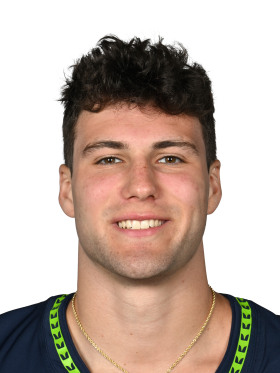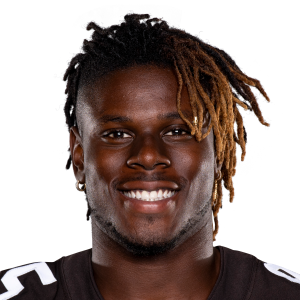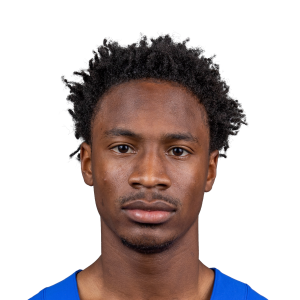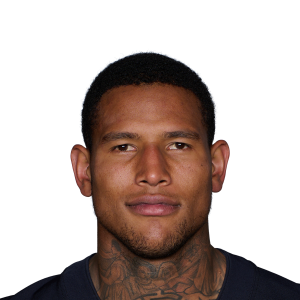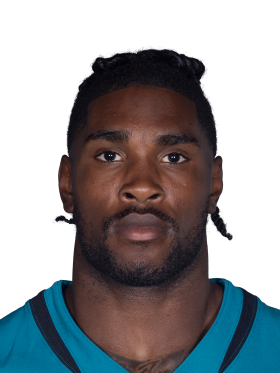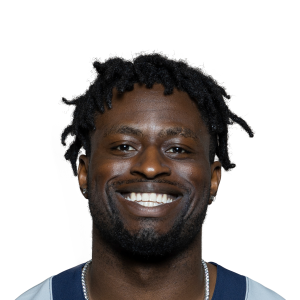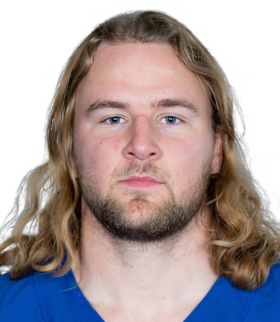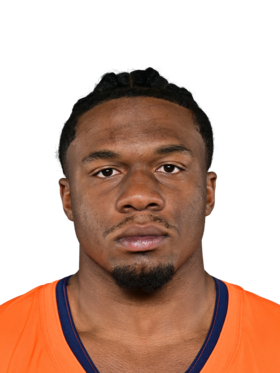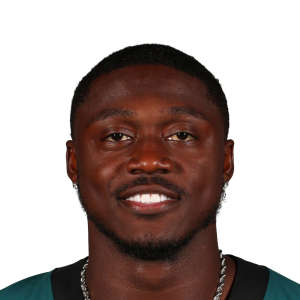

Andrew Cooper dismissed the idea that rookie AJ Barner could become fantasy-relevant in Seattle, calling him "so slow" and comparing him to pure inline blockers like Durham Smythe and Luke Farrell. Cooper emphasized that Seattle’s new 49ers-style offense will deploy a fullback plus a blocking tight end, soaking up 800 snaps that generate almost no targets. That structure funnels volume to a single pass-catching tight end, but Cooper is adamant Barner is not athletic enough to seize that role—he cited a 4.8 forty and lack of downfield ability. Even if the Seahawks cut Noah Fant to save $9.5 million, Cooper believes Barner’s ceiling is a snap-eating decoy, making him a hard pass in late-round Best Ball drafts where drafters should chase top-10 upside, not glorified sixth linemen.


Andrew Cooper said his entire four-tight-end build ultimately hinges on David Njoku and he is comfortable with that because Njoku quietly saw 97 targets in just 11 games last season—a 150-target full-season pace that would have ranked second among all tight ends. Cooper noted that Cleveland threw at a top-10 rate inside the red zone once Joe Flacco and then Deshaun Watson returned, and new OC Ken Dorsey has historically peppered his primary tight end (see Dawson Knox’s eight-TD campaign in Buffalo). If Njoku even comes close to last year’s per-game usage, Cooper expects a top-7 finish at the position, making him a perfect late anchor in Best Ball rooms where drafters punt TE early and bank on one upside swing hitting.


Andrew Cooper tagged Tutu Atwell as a sneaky final-round pick who could bail out Rams-heavy Best Ball builds. Los Angeles lives in 11 personnel, and with no Demarcus Robinson on the roster Atwell is locked into the WR3 job—good for roughly 70% route participation even when everyone is healthy. Cooper noted Sean McVay has historically produced multiple usable weeks from peripheral deep threats (think 2022 Ben Skowronek), and Atwell’s 4.39 speed gives him multi-TD, long-ball potential anytime coverage tilts toward Cooper Kupp and Puka Nacua. If either starter misses time, McVay’s pass-rate-over-expectation inside the 20 (top-8 last season) would funnel additional red-zone shots Atwell’s way. Cooper is happily scooping him after pick 200 as cheap injury insurance with legit 60-yard house-call upside.


Andrew Cooper called the Dolphins’ tight-end depth chart "a complete dumpster fire" and is fading it across all Best Ball formats. Miami let 800-yard producer Jonnu Smith walk, then replaced him with Darren Waller, whose last three seasons have been derailed by chronic hamstring flare-ups and a mid-career retirement to pursue rap. Behind Waller sit Tanner Conner, Julian Hill, and late-round rookie Jalen Conyers—names Cooper said “wouldn’t even scare a Sun Belt defense.” He reminded listeners that Mike McDaniel’s scheme already siphons snaps to a fullback and extra blockers, leaving precious few pass routes for whoever starts. If Waller’s legs betray him again, Cooper sees zero fantasy-usable contingencies, making the entire room a trap pick despite Miami’s explosive offense. His advice: fade Waller at current ADP and allocate late-round tight-end darts to cleaner depth charts.


Andrew Cooper told Pete to hammer the Patriots’ 8.5-win line because, in his words, "they finally have their quarterback." Cooper compared Drake May’s per-game production to Bo Nix and even Josh Allen’s college numbers, arguing New England has found its franchise passer. He also highlighted the return of Mike Vrabel and Josh McDaniels—"culture guys who will recreate the 2010s offense"—plus a revamped defense that soaked up most of their free-agency cash and draft capital. With a one-two backfield of Rhamondre Stevenson and rookie TreyVon Henderson and reliable chain-mover Stefon Diggs on the outside, Cooper expects the Pats to challenge Buffalo for the division’s second spot. Vegas already lists them with the second-shortest odds to finish runner-up in the AFC East, so Cooper is betting the over now before the market adjusts and is comfortable taking discounted Patriots skill pieces in Best Ball builds that need late correlation.


Andrew Cooper grabbed Tank Bigsby deep in the draft and defended the pick despite market hate. Citing PFF’s Nathan Jahnke, Cooper reminded listeners that backs who eventually grab the starting role produce the most RB1/RB2 weeks. Bigsby was the Jaguars’ most efficient runner in 2023 and, in Cooper’s view, could simply win the job outright if Travis Etienne stumbles. That asymmetric upside makes him an ideal RB4/5 in Best Ball rooms where drafters chase receiving backs instead. Cooper believes Bigsby’s path to a full workload— behind an improved offensive line and in a Doug Pederson offense that historically feeds its lead back near the goal line— is being underestimated, and he expects multiple usable spike weeks if the second-year back seizes early-down and red-zone work.


Andrew Cooper said Chig Okonkwo is his favorite tight end after pick 140 in Best Ball drafts. Cooper highlighted Okonkwo’s 4.52 forty (97th-percentile for TEs) and the fact he is one of the few tight ends to post multiple 40-plus-yard receptions in a single season. With rookie quarterback Cam Ward going outside Round 15, Cooper loves the dirt-cheap two-player stack, noting that if Ward pops, Okonkwo’s down-field speed makes him the primary beneficiary. The only competition is Gunner Helm and Josh Wiley— neither of whom Cooper believes can threaten Okonkwo’s route share. Because late-round rooms often need correlation, Cooper is “almost auto-clicking” Chig whenever he drafts Ward, betting that the Titans’ new offense will scheme vertical shots and let the athletic tight end rack up spike weeks.


Andrew Cooper believes Indianapolis may finally collapse its perennial four-man tight-end rotation and let rookie Tyler Warren emerge as the clear No. 1. He pointed out that the Colts have used a mix-and-match committee – Trey Burton, Kylen Granson, Mo Alie-Cox, Drew Ogletree, etc. – for seven straight seasons, crushing fantasy value. The current depth chart still lists multiple bodies, but Cooper thinks the athletic Warren profiles differently and could seize a 65-70% route share. If that happens, even a league-average Anthony Richardson passing volume would funnel enough red-zone looks to make Warren a late-round smash in Best Ball rooms starved for usable tight-end weeks. Cooper is sprinkling Warren as his TE3 in three-tight-end builds, betting on talent finally breaking Frank Reich–era habit.


Andrew Cooper said he is flat-out passing on Brock Bowers at his early-Round-2 Underdog ADP. Cooper reminded listeners that positional scarcity only matters if the player can actually separate on raw points, and tight ends almost never get there. The best PPR season ever was Rob Gronkowski’s 330 points – a far cry from the 400-point campaigns we occasionally see from wide receivers drafted in the same range. Because Bowers would have to post an all-time rookie season just to keep pace with his draft slot, Cooper prefers loading up elsewhere and employing a three-tight-end room later. He referenced last year’s Best Ball Mania winner, whose championship lineup started Juwan Johnson for peanuts, as proof that waiting can work. Cooper will still grab Travis Kelce, Mark Andrews or Evan Engram if they slide, but he called Bowers (and fellow early riser Trey McBride) land mines at current cost.


Andrew Cooper drafted rookie running back RJ Harvey for pure upside, pointing to Joe Lombardi’s track record of funneling throws to the backfield. Cooper stressed that in every season Lombardi has been on an NFL offensive staff—18 years running—the offense has finished inside the top five in running-back targets. He expects Lombardi to keep that check-down heavy philosophy, giving Harvey an immediate path to passing-down snaps and spike-week PPR production even if he shares early-down work. Cooper framed Harvey as the kind of late-round swing that can pop in Best Ball builds where you’ve already taken volatile pieces like Taysom Hill and need high-ceiling insurance.


Andrew Cooper said A.J. Brown is one of his favorite buy-back targets because he expects Philadelphia to throw far more than last season. The Eagles finished dead last in pass attempts in 2023 and Jalen Hurts managed only 2,900 passing yards, yet Brown still turned roughly 90 targets in 13 games into elite fantasy production. Vegas has already hung a noticeably higher passing-yards prop for Hurts, a signal to Cooper that the market is bracing for a shift toward a league-average pass rate under new OC Kellen Moore. If Hurts pushes past 3,500 yards as Cooper projects, Brown could flirt with 140+ targets and regain overall WR1 upside. Cooper is scooping Brown in the mid-first of Best Ball drafts before the broader market prices in the expected volume bounce.



